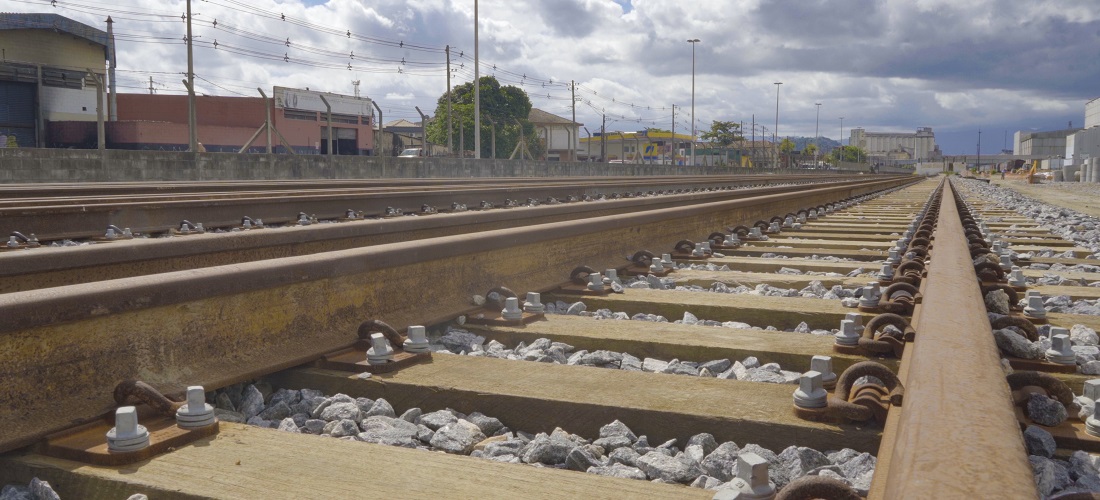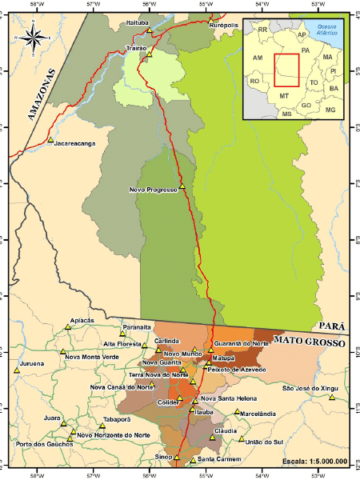
Supreme Court to decide fate of Brazil’s top grain railway amid gov’t clashes
May, 29, 2023 Posted by Gabriel MalheirosWeek 202322
This week, the plenary of the Brazilian Supreme Court (STF) is expected to deliberate on the clearance of Ferrogrão, a new railway connecting Sinop, in Mato Grosso, to Miritituba, in northern Pará, at a time when conflicts between different government factions over projects in the Amazon are escalating. The court’s analysis of the case is scheduled for Wednesday, May 31.
The internal divisions within the government became public two weeks ago when the Brazilian Institute of the Environment and Renewable Resources (Ibama) expressed opposition to Petrobras’ plan to drill an exploratory well off the coast of Amapá, near the mouth of the Amazon River.
Regarding the ambitious railway megaproject, with a budget exceeding R$ 20 billion, the Supreme Court’s deliberations revolve around a change in the limits of the Jamanxim National Reserve Park to accommodate the project in Pará. The railway project aims to revolutionize the transport of grains from Mato Grosso to ports and waterways in the country’s Northern region.
Prompted by an action filed by the Psol party, Justice Alexandre de Moraes accepted the argument that a protected area could not be modified with a provisional measure (MP). In 2021, he suspended all hiring and studies related to the project.
The Ferrogrão MP was signed in 2016 during Michel Temer’s administration. The measure expanded the margins of BR-163 within Jamanxim Park to accommodate the railway alongside the federal highway. Out of the 933-kilometer railway, 53 kilometers pass through the park.
When Moraes issued the injunction, the government under Jair Bolsonaro was preparing to launch the auction for the project. The only remaining requirement was the Federal Audit Court (TCU) approval.
The Ferrogrão case is currently being tried in the Supreme Court, with Minister Moraes as the rapporteur. While the analysis of the matter is scheduled for the 31st, there is a possibility it could be postponed to the following week. This case is the last item on the court’s list, which also includes two other important discussions: the penalty for former president and senator Fernando Collor and the ruling on the decriminalization of personal drug possession.
Considering the history of court rulings, the justices have been engaged in what is referred to as the “green agenda.” The court’s sensitivity to environmental issues has led to decisions favoring maximum protection of the environment. Therefore, even if the Ferrogrão process is delayed, it is likely that the case will soon return to the agenda.
According to sources familiar with the matter, another possible outcome is for the rapporteur to propose a conciliation procedure for the Ferrogrão case.
On Friday, the Attorney General’s Office (AGU) submitted a statement to the STF supporting the unconstitutionality of the law that altered the perimeter of Jamanxim Park. During the previous administration, the AGU favored the railroad’s progress at any cost.
Now, prosecutors argue that the final text approved by Congress excluded the compensatory measure of incorporating over 51,000 hectares of the Tapajós environmental protection area into the park.
The Union’s lawyers highlight that the initial plan, stated in the provisional measure, included the incorporation of the protected area into Jamanxim Park but underwent modifications during the legislative process. The AGU maintains that such a decision should be based on prior studies confirming its ecological suitability.
In conclusion, the agency requests the “partial revocation of the precautionary measure” by the Supreme Court to resume the “regular continuation of administrative processes related to Ferrogrão, including the renewal of studies, while observing all legal criteria, including socio-environmental aspects.”
According to Valor’s sources, a favorable decision to allow new studies would not be seen as a defeat by members of the Ministry of Transport. They argue that the data from 2013 is outdated. “It is not possible to analyze the current impacts with such old numbers or to justify the need for the project,” stated an official source.
On the other hand, the Ministry of the Environment is firmly against the approval of the railway. The ministry believes that the construction of Ferrogrão could heighten deforestation. With the setbacks suffered last week, witnessing important attributions of their ministry slipping away, many analysts say that the Ministers of the Environment, Marina Silva, and of Indigenous Peoples, Sônia Guajajara, “cannot afford any more defeats.” In AGU’s first stance regarding Ferrogrão under the Lula 3 administration, government insiders interpreted the initiative as a gesture towards the environmental and indigenous factions.
Minister Renan Filho (Transport) is attempting to dissociate Ferrogrão from Bolsonaro, who is considered insensitive to environmental issues. The studies for Ferrogrão, he said, were authorized ten years ago, during the Dilma Rousseff administration.
“Ferrogrão began long before the previous government, and now it is important to explore possibilities for its implementation because every day Brazil needs more investments in infrastructure, especially due to the significant growth in agricultural output, which achieves successive records year after year,” the minister stated to Valor.
Source: Valor Econômico
To read the original news report, please visit: https://valor.globo.com/brasil/noticia/2023/05/29/stf-julga-obra-da-ferrograo-em-meio-a-embate-ambiental.ghtml
-
Sugar and Ethanol
Mar, 11, 2025
0
Brazil in talks to expand U.S. sugar export quota
-
Grains
May, 09, 2023
0
China’s soy imports hit by stricter customs checks
-
Meat
Oct, 07, 2024
0
Kosher slaughter stands in the way of Brazilian poultry exports to Israel
-
Fish
Aug, 30, 2023
0
Brazilian fish industry urges gov’t to prioritize fish exports to EU




